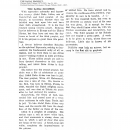Main menu
- ‘Abdu’l-Bahá’s Journey
- World Peace
- Stopping Racism in America
- Empowerment of Women
- More Principles...
- Prayer for America
The Bahá’í Prophet
Chicago Daily Tribune (1872-1922); Sep 24, 1911;
ProQuest Historical Newspapers Chicago Tribune (1849-1987)
With oppressive solemnity and impressive secrecy ‘Abdu’l-Bahá Abbas, son of Bahá’u’lláh and third prophet of the Bahá’ís, is traversing Europe that his faithful may look upon him and have their faith strengthened. It is his first venture among western people. Bahá’ísm has its followers in Europe and the United States, but they have not seen the features or beard of the third prophet, and it is his purpose to grant them this privilege.
A devout believer describes Bahá’ísm as the spiritual Esperanto, seeking to demonstrate the fundamental unity of all religions, and to trace them to one divine source — seeking further to unite all faiths in one. Three million people are said to have devoted themselves to this undertaking, and ‘Abdu’l-Bahá Abbas is their prophet.
His father was the second prophet, but there was a life of misfortune so acute that ‘Abdu’l-Bahá Abbas was born in jail. The first prophet, Mirza Ali Mohammad, also was a man of woe. He, known as the Báb, was born in Shiraz, Persia, in 1819, founded the Bahá’í religious movement, and was shot at Tabriz six years after he had declared his mission.
Bahá’u’lláh, the Glory of God, succeeded him and passed most of a vexatious existence in exile from Persia and in jail. To him ‘Abdu’l-Bahá Abbas was born, and the mantle fell from the shoulders of the father on those of the son.
‘Abdul is a prophet of prophets. His turban tops a coil of snow white hair, and that surmounts a strong, clean cut face in which a pair of clear blue eyes are lamps of the soul. A beard, long and white, completes the impressiveness of the picture.
He is a fortunate prophet. It is the experience of such as have the privilege of being admitted to his presence that they have no wish to talk. The prophet dominates. They sit silently on his word, which, when it comes to him, rushes forth in an eloquence said to be “beyond description.”
He is a happier prophet than the other two. They languished under the pressure of unkind fate. He tours abroad and increases the confidence of the faithful. Presumably he now is in London. A week ago he was expected there, but even to the devotees no certain word of his coming was given. It is enough for them that they should know when he, with his Persian secretaries and interpreters, has come. The third prophet of the Bahá’ís does not employ a press agent. A week is to be given to Paris, where there are believers. Little else is known of his movements.
Publicity may help an actress, but secrecy is the first aid to prophets.









